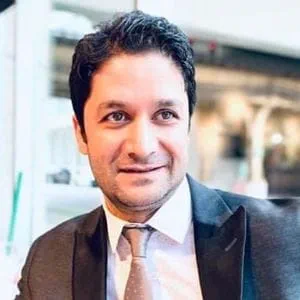Research innovations from EDT investigators
Members of the Experimental and Developmental Therapeutics research program at IU Simon Comprehensive Cancer Center are improving cancer therapy with a “bedside-to-bench-to-bedside” approach.
Members of the Experimental and Developmental Therapeutics research program at IU Simon Comprehensive Cancer Center are improving cancer therapy with a “bedside-to-bench-to-bedside” approach.

A study led by EDT member Ashiq Masood, MD, uncovered notable differences between primary and metastatic pancreatic cancer, which could lead to new treatment strategies for the often-deadly disease. Study senior author Masood used spatial transcriptomic, a method to study a region of cells and their interactions, to uncover these ecosystems of pancreatic cancer.
Miller SA, et al. LSD1 and Aberrant DNA Methylation Mediate Persistence of Enteroendocrine Progenitors That Support BRAF-Mutant Colorectal Cancer. Cancer Res. 2021 Jul 15;81(14):3791-3805.
Wilson DM 3rd, et al. Fragment- and structure-based drug discovery for developing therapeutic agents targeting the DNA Damage Response. Prog Biophys Mol Biol. 2021 Aug;163:130-142.
Su X, et al. PCNA inhibition enhances the cytotoxicity of -lapachone in NQO1-Positive cancer cells by augmentation of oxidative stress-induced DNA damage. Cancer Lett. 2021 Oct 28;519:304-314.
John Turchi, PhD, recently received a five-year, $2.5 million grant from the National Cancer Institute to develop a novel therapy to treat lung cancer.
Dr. Turchi’s lab is studying a protein called replication protein A (RPA), which binds to single-strand DNA to signal DNA damage response (DDR) to repair the damage and make new cells.
They crafted a small drug-like molecule designed to disrupt the DNA repair pathways that allow lung cancer cells to continue replicating and tumors to grow. They’re now poised to move findings from the lab towards clinical applications.
Collaborators on the NCI grant include EDT members Karen Pollok, PhD, director of the In Vivo Therapeutics Core, and physician-scientists Shadia Jalal, MD, and Catherine Sears, MD.
We aim to determine if patient-specific ecotypes exist and their influence on prognosis and treatment response, which will be vital for developing effective combination therapies.
Ashiq Masood, MD